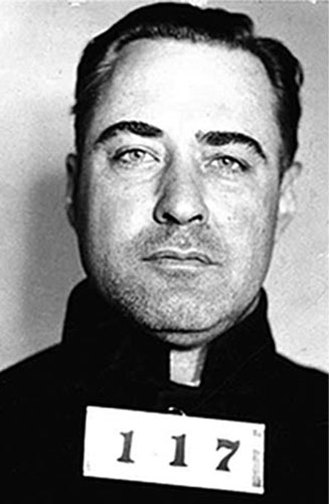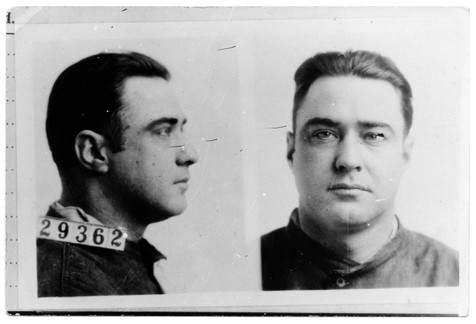Machine Gun Kelly
From a silver spoon to a tin cup

George Kelly
If ever there was a man less suited to becoming a "Big Name" criminal during the Golden Age of Bankrobbing, it was George "Machine Gun" Kelly. A seemingly good-natured guy from a well-to-do family, and who had attended college, Kelly made some bad choices that led him into bootlegging, bankrobbing, kidnapping, and finally to Alcatraz. But his worse choice seems to have been to marry his second wife, Kathryn Thorne. It was she, most crime historians believe, that established his (less than deserved) reputation as a major player in the crime world, and gave him his nickname "Machine Gun" (a weapon he could hardly use and didn’t like). If it wasn’t for her, he likely would have remained a small-timer shuffling from one shady deal to the next, one of thousands of faceless criminals lost to history.
George Kelly was born George F. Barnes July 18, 1900, in Chicago, but grew up in Memphis, Tenn., the son of a well-to-do insurance executive. He was at odds with his father most of his life, but seemed devoted to his mother, Elizabeth Kelly Barnes, who died shortly before Barnes graduated high school. He blamed his father’s infidelity for his mother’s death, claiming she died of a broken heart.
While a student at Memphis’ Central High School, and with access to the family car, Barnes began to do a little bootlegging (Tennessee adopted prohibition in 1909). During his sophomore year he was arrested on liquor charges, but using his father’s influence he was able to avoid prison.
After graduating from high school, Barnes enrolled at Mississippi A & M (now Mississippi State University) to study agriculture. His college career lasted less than a year. In the first semester, he picked up 31 demerits and 24 more during the first few weeks of the second semester. His highest grade was a C-plus, which he received in a Physical Hygiene course. He received a zero in woodwork and an "incomplete" in military science.
He quit school shortly after the start of the second semester and returned to Memphis where, still using his father’s influence to open doors, began attending social gatherings. It was at one of these he met Geneva Ramsey, daughter of successful Memphis businessman George F. Ramsey, who knew of Barnes’ reputation and forbade his daughter to see him. She was taken by Barnes’ charm, however, and continued to see him. One night, on a drive to Mississippi, Barnes convinced Geneva to elope. After the wedding they stayed for several days with the daughter of the governor of Mississippi, a friend of Geneva’s, before returning to Memphis.
Despite her father’s initial dislike and mistrust of Barnes, George Ramsey, who had developed a prosperous business building levees and railroads in the Mississippi River Valley, believed Barnes was making an honest effort to turn his life around and offered him a job. The pair seemed to have developed a mutual respect, and Barnes looked up to Ramsey as a father figure. In the mid-1920s, however, Ramsey died as a result of a dynamite accident. This incident devastated Barnes, and sent him into a tailspin that led to one failed job after another.
Ramsey's widow sold the business and tried to help her daughter and son-in-law get a fresh start. A used car business didn't work out, and neither did a goat farm. Discouraged, Barnes turned to his father and tried the insurance business, but when this didn't produce the results he wanted he turned back to bootlegging, the one thing in which he had achieved some success.
His wife was firmly against his "career move," and repeatedly threatened to divorce him, and even left him on several occasions. By this time, however, they had a son, George Jr., whom they called Sonny. Barnes was not a good father and paid little attention to his first son. Sonny would grow to resent his father, and have little to do with him in later life. (A second son, Bruce, remained loyal to his father and would even write a book about him. "Machine Gun Kelly: To Right a Wrong" would correct a lot of the misconceptions about Kelly’s life and times.)
As Barnes got deeper into bootlegging, his drinking increased and so did the physical and emotional abuse of his wife and oldest son. (He seemed devoted to Bruce, however, and doted heavily on him.) Barnes eventually went to Kansas City, again attempting a fresh start. He got a job as a checker in a grocery store, and once more convinced Geneva to give him another chance. She and the children soon joined him, but a short time later realized he was stealing from the store. Geneva packed up the family and returned to Memphis, this time leaving Barnes for good. She was later granted a divorce. Barnes, now completely on his own and calling himself George Kelly, began his final downward spiral as he turned to crime full-time.
George Kelly was born George F. Barnes July 18, 1900, in Chicago, but grew up in Memphis, Tenn., the son of a well-to-do insurance executive. He was at odds with his father most of his life, but seemed devoted to his mother, Elizabeth Kelly Barnes, who died shortly before Barnes graduated high school. He blamed his father’s infidelity for his mother’s death, claiming she died of a broken heart.
While a student at Memphis’ Central High School, and with access to the family car, Barnes began to do a little bootlegging (Tennessee adopted prohibition in 1909). During his sophomore year he was arrested on liquor charges, but using his father’s influence he was able to avoid prison.
After graduating from high school, Barnes enrolled at Mississippi A & M (now Mississippi State University) to study agriculture. His college career lasted less than a year. In the first semester, he picked up 31 demerits and 24 more during the first few weeks of the second semester. His highest grade was a C-plus, which he received in a Physical Hygiene course. He received a zero in woodwork and an "incomplete" in military science.
He quit school shortly after the start of the second semester and returned to Memphis where, still using his father’s influence to open doors, began attending social gatherings. It was at one of these he met Geneva Ramsey, daughter of successful Memphis businessman George F. Ramsey, who knew of Barnes’ reputation and forbade his daughter to see him. She was taken by Barnes’ charm, however, and continued to see him. One night, on a drive to Mississippi, Barnes convinced Geneva to elope. After the wedding they stayed for several days with the daughter of the governor of Mississippi, a friend of Geneva’s, before returning to Memphis.
Despite her father’s initial dislike and mistrust of Barnes, George Ramsey, who had developed a prosperous business building levees and railroads in the Mississippi River Valley, believed Barnes was making an honest effort to turn his life around and offered him a job. The pair seemed to have developed a mutual respect, and Barnes looked up to Ramsey as a father figure. In the mid-1920s, however, Ramsey died as a result of a dynamite accident. This incident devastated Barnes, and sent him into a tailspin that led to one failed job after another.
Ramsey's widow sold the business and tried to help her daughter and son-in-law get a fresh start. A used car business didn't work out, and neither did a goat farm. Discouraged, Barnes turned to his father and tried the insurance business, but when this didn't produce the results he wanted he turned back to bootlegging, the one thing in which he had achieved some success.
His wife was firmly against his "career move," and repeatedly threatened to divorce him, and even left him on several occasions. By this time, however, they had a son, George Jr., whom they called Sonny. Barnes was not a good father and paid little attention to his first son. Sonny would grow to resent his father, and have little to do with him in later life. (A second son, Bruce, remained loyal to his father and would even write a book about him. "Machine Gun Kelly: To Right a Wrong" would correct a lot of the misconceptions about Kelly’s life and times.)
As Barnes got deeper into bootlegging, his drinking increased and so did the physical and emotional abuse of his wife and oldest son. (He seemed devoted to Bruce, however, and doted heavily on him.) Barnes eventually went to Kansas City, again attempting a fresh start. He got a job as a checker in a grocery store, and once more convinced Geneva to give him another chance. She and the children soon joined him, but a short time later realized he was stealing from the store. Geneva packed up the family and returned to Memphis, this time leaving Barnes for good. She was later granted a divorce. Barnes, now completely on his own and calling himself George Kelly, began his final downward spiral as he turned to crime full-time.

